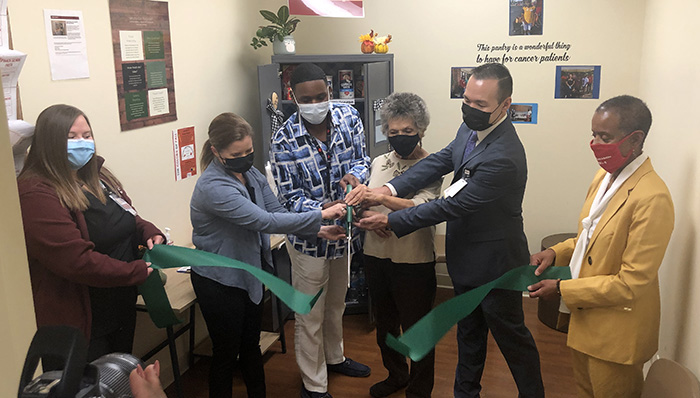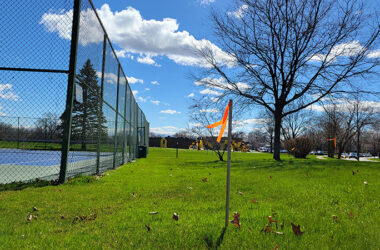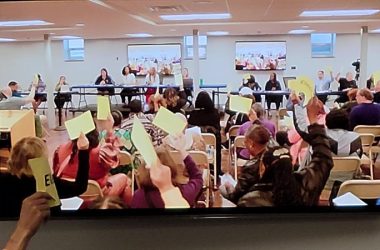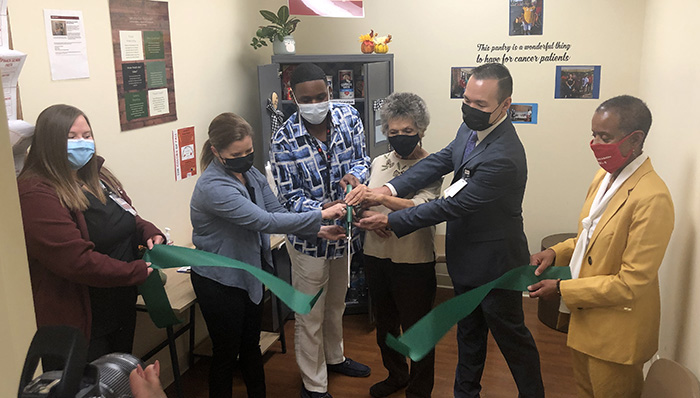
Paul Dickerson, a licensed social worker at UChicago Ingalls Memorial, cut the ribbon to mark the official grand opening of Ingalls’ Complimentary Nutrition Station in Flossmoor on Thursday, Nov. 4.
The Nutrition Station is focused on helping Ingalls patients, especially cancer patients, but officials stress that no person will be turned away.
Dickerson, who works in the Oncology-Hematology department at Ingalls Memorial, was joined at the food pantry’s ceremony by Flossmoor Mayor Michelle Nelson, UChicago-Ingalls President Randy Neiswonger, Meghan Hammerstein of Ingalls’ Oncology-Hematology department, Center for Food Equity in Medicine Director and founder Dr. Ann Jackson and the cancer patient Laverne Harkins, who has utilized the Nutrition Station.
While the ribbon-cutting ceremony was held at Ingalls’ Flossmoor site, it represented the opening of all three Complimentary Nutrition Station locations – Flossmoor, Tinley Park and Harvey.
The Tinley Park and Harvey stations have been serving patients since June 6 and the Flossmoor location has since Oct. 4, Dickerson said. The grand opening ceremony was an opportunity to draw attention to the Nutrition Station’s availability to patients and to celebrate all who helped make it happen.
“Cancer has such a profound impact on someone’s financial situation, and one of the things that people end up having issues with is food insecurity,” said Margaret Marriott, director of cancer research and cancer registry at Ingalls. “And when you’re undergoing cancer and cancer treatment, your nutrition and your hydration are so important in the healing process.”
Previously, if a cancer patient was food insecure, Dickerson could only recommend a local food pantry unaffiliated with the hospital. This wasn’t as convenient as a pantry at the hospital itself. Dickerson said local pantries don’t always have options as nutritional as what’s available at the Complimentary Nutrition Station.
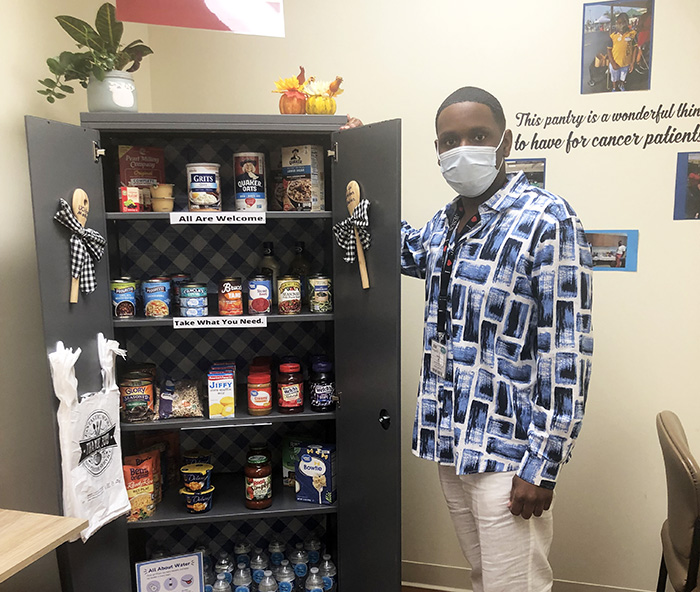
shows the foods available through the program.
(Nick Ulanowski/H-F Chronicle)
When spearheading the Station, Dickerson partnered with Ingalls’ nutrition experts Cheryl Bacon and Katherine Whited and the Center for Food Equity in Medicine. In addition to helping behind the scenes with inventory, the center helps purchase food items and stock the shelves, said Jackson.
“We’re not calling it a food pantry because of the stigma. We’re calling it a Complimentary Nutrition Station,” said Dickerson. “We have collard greens. We have low-sodium chicken broth. We have low-sugar pasta. We try to do veggie pasta. We have grits. We have raisins and sugar-free apple sauce. We have low-sodium rice and things of that nature.”
In addition to food, the Nutrition Station has bottled waters. Fresh fruits and vegetables are available to patients who request it. And they have printed recipes showing how patients can make meals out of the food being provided.
At the Nutrition Station, a patient can take as much as they want. While the food and water are intended for cancer and hematology patients, if someone who isn’t a patient goes to the Nutrition Station, they won’t ask them to prove they’re a patient. All the Nutrition Station asks is the individual write down their zip code and how many people they’re feeding. But even if they decline to do this, no one will be turned down, Dickerson said.
“If one family or one person were to come and wipe out our shelf completely, that would be perfectly fine. Because in my mind, they must need it if they took it all,” said Dickerson.
Dickerson said creating the Nutrition Station was a four-year endeavor. He said he observed that a lot of patients were food insecure, and they were having to choose “between eating nutritiously and following up or following their chemo regiment or treatment plan with their doctors. And that’s just a decision I don’t want anyone to have to make, especially when they have such a chronic illness.”
Harkins said she has stage four cancer. And she described the Nutrition Station as a “God send.”
“There have been times I didn’t know if I should pay my electric bill or other bills or buy groceries. I found out that we could take advantage of this. It has helped me so much,” said Harkins. “I have lost 60 pounds over the course of three years [of having cancer]. I have now gained five pounds back.”
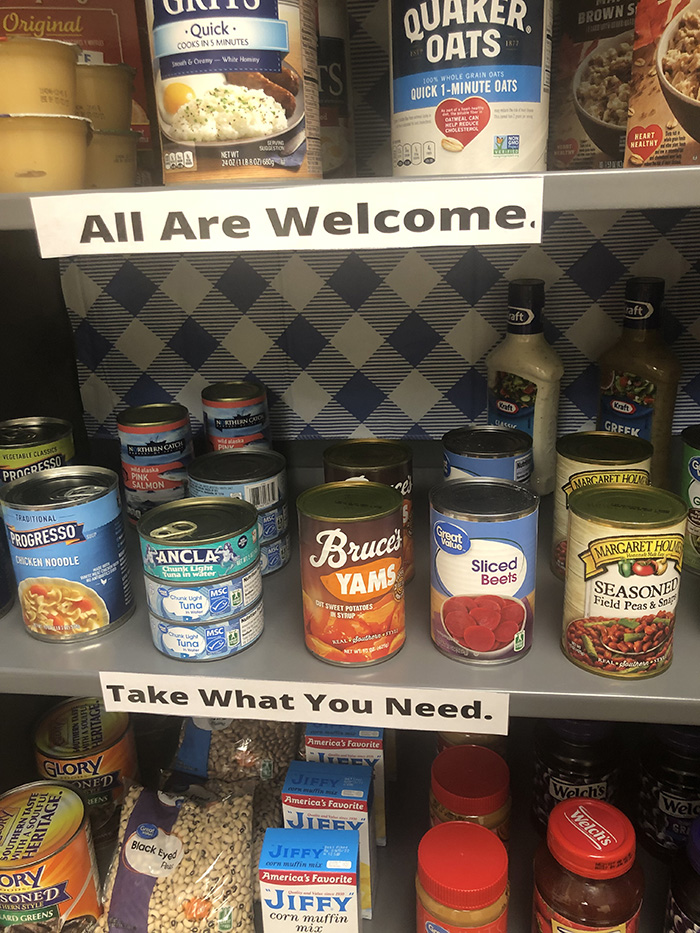
Nutrition Station in Flossmoor suggest the new
program’s welcoming approach to its mission.
(Nick Ulanowski/H-F Chronicle)
Dickerson, Neiswonger, Hammerstein, Nelson, Bacon, Jackson and Ingalls’ Vice President of Philanthropy and Community Relations Paul E. Donahoe all spoke at the ceremony.
In his speech, Dickerson said that in Maslow’s Hierarchy of Needs, food and shelter are most important and he never wants a patient to have to choose between proper medical care and getting something to eat. Dickerson said he was initially worried that “little old me” wasn’t a big enough member of the “the pond” to make a difference about food insecurity among patients, but he’s happy to say that he could and did.
Nelson said in her speech: “We are extremely fortunate to have this facility here in Flossmoor.”
“Food insecurity […] is really leveling up now with the pandemic,” said Neiswonger. “We’re seeing families experience food insecurity maybe for the first time in their entire life.”
“Folks, what you are experiencing right now at this moment, this is a community hospital,” said Donohoe in his speech. He said it took co-operation and quality leadership to make this happen, but it all started with Dickerson “lighting the spark.”
The Complimentary Nutrition Station in Flossmoor is open whenever the U Chicago Medicine Oncology-Hematology office is open, typically from 8 a.m. to 4:30 p.m.

